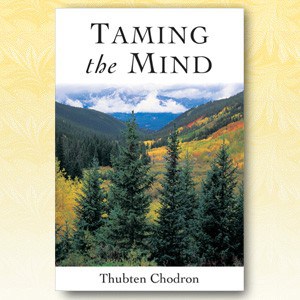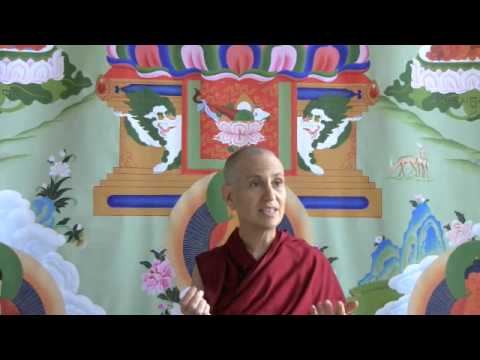The dukkha of uncertainty
Stages of the Path #92: The First Noble Truth
Part of a series of Bodhisattva's Breakfast Corner talks on the Stages of the Path (or Lamrim) as described in the Guru Puja text by Panchen Lama I Lobsang Chokyi Gyaltsen.
- Dukkha that is pervasive for all realms of existence
- Becoming accepting and flexible when things change
- Using uncertainty as a reason to get out of samsara
We talked about the three kinds of dukkha and the eight kinds of dukkha. Now there’s the six kinds of dukkha, and these are pervasive for all of the realms of cyclic existence.
The first one is the lack of certainty, which means that in cyclic existence everything is uncertain. Now, if you haven’t figured that out living at the Abbey then stay here longer and you will. Not only do our plans change every half day, or even shorter, but if we look everything…. Just the change of daily plans is just symptomatic of how uncertain everything in our lives is. We all want certainty, we want security, we want control, we want to know exactly how things are going to be so there’s no surprise, and that they’re secure and stable and good, and life is not like that at all. Things are so uncertain.
When we die is uncertain, even though THAT we die IS certain. When we get sick. When we get what we like. When we don’t get what we like. What happens on a day to day basis. Everything is completely uncertain.
If we meditate on this deeply, on a day to day basis, this helps us in the sense that we stop trying to control things and we become more flexible and when things change we’re able to roll with it a little bit better. That’s the benefit we receive this lifetime from adjusting our mind to the idea of uncertainty.
Beyond that, and this is where it really becomes important in the Dharma, when we see the uncertainty in samsara then we see that that’s a reason that samsara is not a good place to hang out. That is, things are so unpredictable and so under the control of afflictions and karma then what’s the use of trying to stay in cyclic existence and enjoy it here? Because what we long for is some kind of actual stability. That comes through attaining liberation, through attaining enlightenment, because at that point our mind is stable.
In the Pali canon nirvana is also called the deathless, or the unconditioned. When you perceive nirvana that is stable and secure, that’s certain, that isn’t changing moment to moment. It isn’t a conditioned phenomena. That’s how you would say it in the Pali canon.
In the Tibetan way, the Mahayana way, you would say the understanding of emptiness is something secure, something certain, and then what it does is it stabilizes our mind as well, because even though the mind is changing moment by moment, when it is no longer under the influence of afflictions and karma then the mind is much more stable. Then even if the external world is changing a lot and unpredictable, the mind knows exactly how to follow it and doesn’t get buffeted around and whacked out by it.
Really think about this, in your own life, think about how we want everything to be certain and secure and planned and in control, and how… Just look at our lives and how things are not like that. Things are completely uncertain. And that’s unsatisfactory for beings who want some kind of certain, long lasting state of peace and joy. So from there we generate renunciation.
Venerable Thubten Chodron
Venerable Chodron emphasizes the practical application of Buddha’s teachings in our daily lives and is especially skilled at explaining them in ways easily understood and practiced by Westerners. She is well known for her warm, humorous, and lucid teachings. She was ordained as a Buddhist nun in 1977 by Kyabje Ling Rinpoche in Dharamsala, India, and in 1986 she received bhikshuni (full) ordination in Taiwan. Read her full bio.


